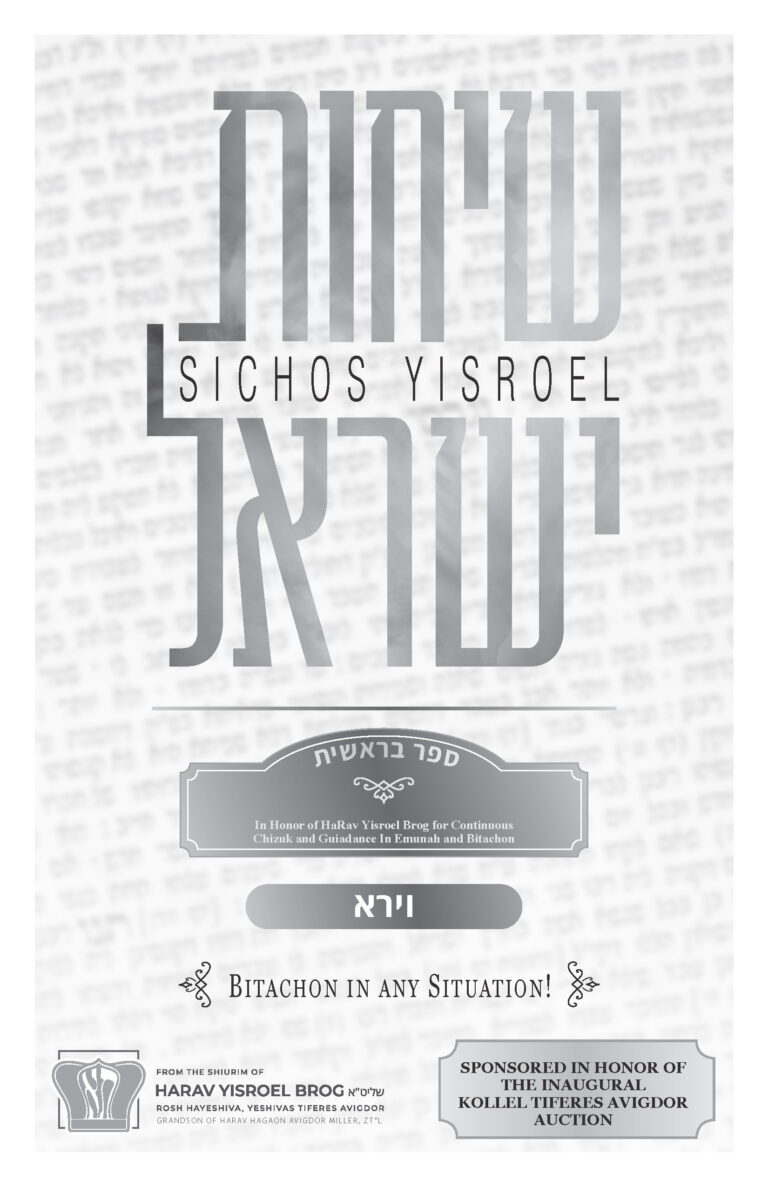Noach 5784: What Destroyed Noach’s Generation?
Sponsored
In Honor of all the Kedoshim May We Be Zoche to Greet Moshiach B’Karov
Consider sponsoring a shiur
Visit YTATorah.org
Shiur presented in 5768
Parshas Noach: What Destroyed Noach’s Generation? (5767)
Unlimited Ta’avah
We have previously discussed the sin of the dor hamabul and we showed you the words of Rabeinu Tam, who says that if a person starts with a little bit of ta’avah and he allows himself to do whatever he wants, there’s no end to it.[i]
I wanted to just point out that this was clearly demonstrated in the generation of the mabul. What did it all start from? It all started from desire. They took from whatever they wanted. And what happened in the end? They ended up living with beheimos. They ended up living with males. All from starting from a ta’avah of what you could call a normal healthy ta’avah. That’s all. This is the Rabeinu Tam.
Rationalizing Evil
Now there’s another yesod I want to share with you this year for the first time. We learned in Bava Metzia (47b-49a) that there’s a concept called a mi shepara. A person who gives his word in financial dealings and doesn’t keep it is subject to the curse of me shepara, under certain circumstances. The curse of mi shepara means: “The One Who exacted the retribution from the dor hamabul, will exact retribution from you.”
Let’s say somebody acts in a dishonest manner where he gives his word and then doesn’t keep it. Instead he claims, “I didn’t make a kinyan. I never signed any documents. I never gave you anything.” Under certain circumstances, he is subject to this curse. “Whoever exacted punishment from the dor hamabul, will exact punishment from you.” The question is what’s pshat in this mi shepara? What’s so unique about dor hamabul?
You have to realize that the dor hamabul had two things that were unique about them. Number one, the whole aveirah that they did, they did it beofen haheter (allowed matter). There are two kinds of reshaim. There’s one rasha who knows what he’s doing is wrong, and he acknowledges what he’s doing is wrong. That guy is a rasha, but there’s still hope for him. He’s not necessarily a mushchas. He’s not a guy who destroyed himself. As long as the person knows the difference between right and wrong he has hope to change. But what happens when a person thinks he’s doing the right thing or he makes what’s called “cheshbonos.”He uses the halachah to deviate from the ratzon of Hashem. Then that person is what you call exceedingly evil.
That was the uniqueness of the dor hamabul. The dor hamabul didn’t just do something wrong. It says ותמלא הארץ חמס, the passuk says the land became full of chamas, robbery, gezel (Bereishis 6:11). So the midrash says, why doesn’t it say ותמלא הארץ גזל? Why does it use the word chamas?
You know what the gemara says the difference between a chamsan and a gazlan is? A chamsan is a guy who forces someone to sell something. That’s what a chamsan is. That means, if someone would say, “I want your watch. Give me that watch. What’s it worth? Ten bucks? Here is ten bucks.” “I don’t want to sell it,” you say. “Come on, sell me the watch.” You basically force the guy to sell it.
What’s worse a chamsan or a gazlan? You would think the gazlan is worse. You take the thing, and you’re not giving anything in return. From that aspect, it’s definitely worse. A gazlan is worse in that it’s just not right. But there’s an aspect that the person who commits the chamas is worse than the gazlan. Do you know why? Why is the person who commits chamas worse than the gazlan?
Because he rationalizes his actions. He’s moreh heter by telling himself, “I didn’t do anything wrong. I paid the guy money.”
Now, that’s what you get from the gemara. But what I see from the midrash in this parshah is a very interesting pshat: chamas is not a specific type of action where a person steals and gives money – even though that’s what the gemara says. According to the midrash (Bereishis Rabbah 31:5) chamas applies when you steal less than a shaveh prutah, חמס אינו שווה פרוטה וגזל ששווה פרוטה.[ii] That’s also called chamas. Gezel is if the stolen item is a shaveh prutah. The anshei dor hamabul didn’t commit gezel. They committed the aveirah of chamas.
The midrash gives an example of this. A guy would come to the market and he would be selling a box full of tormesin. Tormesin is a type of a cheap vegetable. The reason why it’s cheap is because the gemara says in Brachos that a tormes has to be cooked many, many times in order to make it edible, so it’s a very cheap vegetable. You didn’t sell them by the piece. They were sold in bulk. The guy would open a box. “I’m selling tormesin.”Someone would walk by and grab a tormes. Another guy would walk by and grab himself a tormes. Each guy grabbed one tormes or two tormesin. Each one stole less than what you can go to court and get money back for.
אמר להם הקב”ה, Hakadosh Baruch Hu said to them, אתם עשיתם שלא כשורה, you behaved in an improper, abnormal manner, אף אני אעשה עמכם שלא כשורה, I’m going to behave with you in an abnormal fashion.
There’s a big question we have to ask ourselves. They stole, but do you get a mabul for stealing?! Do you wipe out the whole world for stealing pennies? It says לא נחתם גזר דינם, the straw that broke the camel’s back was the theft. But the avlah was that they were mushchas mamash in their outlook because they did everything with a heter.
How Does Hashem Look at an ‘Intentional Mistake’?
Imagine the following scenario. A person doesn’t like somebody so they decide they want to damage his car or they want to damage him personally. But this person knows that if he damages the other guy, he is going to have to pay. So what does he do? He comes into the beis medrash and says to somebody, “Can you teach me mesechta Bava Kama. I want to learn Bava Kama.”The guy asks, “Why?” “I want to know all the times you’re patur from damages,” the fellow replies. So the other guy tells him, “Okay, sit down. I’ll explain it to you. Grama benezikin is patur. But there’s garmi and grama. Garmi is chayav. There’s also a rule that אין שליח לדבר עבירה. So you have to know how to do it.” The guy gives him a whole Torah. Could you imagine a guy studying Bava Kama with that intention? That guy is much worse than a guy who is an outright mazik and an outright ganav. Do you know why? Because he’s a mushchas within the confines of the Torah. That guy knows what’s wrong, but he’s trying to do what’s wrong in a ‘right way’ in order to make himself feel virtuous.
So Hakadosh Baruch Hu says, “People like that, I wipe out. I obliterate people like that.”
I once met a fellow who was married to a gentile. I told him, “I have one piece of advice for you. Get rid of her! Get rid of her immediately!” So he went to some religious rabbis. He comes back to me saying, “They don’t agree with you. They tell me you’re radical.” I said, “Radical?! I didn’t tell you to shoot her! I said just leave her.” You know what the guy tells me? “Shalom bayis.” I told him, “You heard from a rabbi the word shalom bayis?!” I said, “That person is not a rabbi. For shalom bayis you have to have a bayis!If you’re married to a gentile you don’t have any bayis!”
What kind of shalom bayis is that?! What kind of wild idea is that?! That’s called distortion. It’s like a Reform guy who writes a letter to the ‘Cleveland Jewish Shmattes’ that all the Orthodox worry about is lashon hara. So how could they talk lashon hara about the Reform?! What happened to the halachos of Chafetz Chaim?! He gives a whole story. Somebody showed that article to me. I said, “Write him back a letter immediately that the person didn’t finish learning the Chafetz Chaim. The Sefer Chafetz Chaim says that if somebody is a Reform Jew there is no isur whatsoever to talk lashon hara about him! No isur! He’s not bechlal amisecha. It’s a mitzvah to talk lashon hara about him to put the guy down.”[iii] What kind of chutzpah is it to write such a thing in a paper?! That’s called distortion of the law.
A person has to know that what Hakadosh Baruch Hu dislikes more than anything else is when a person behaves in a forbidden way but he does it ‘bederech hamutar.’ That’s what you have to know. Don’t convince yourself that you are doing the correct thing and that Hashem will change to your will, whether it’s in the area of tzniyus or materialism. Just because others do that, it is not a justification.
That’s the connection between the dor hamabul and the curse of mi shepara. Mi shepara means as follows: A person says, “I gave you my word, but did I make a kinyan? Did I sign on a shtar? So I’m not bound. I’m not liable.” You know what we say? “The One who exacted punishment from the dor hamabul is going to come after you.” The dor hamabul said the same nonsense. They said, “That’s not gezel. It’s only one tormes so it’s less than a shaveh prutah. We’re not thieves. We just take little things. We steal things that Hakadosh Baruch Hu doesn’t recognize as theft. If Hakadosh Baruch Hu had thought this was theft He would have said it’s asur.” Why can’t you collect in court for this? So we say, מי שפרע מדור המבול – The One who “collected” from the dor hamabul is going to exact from you also. This is a very important yesod to understand.
Indulgence in Worldly Comforts Until Prikas Ol
There’s one more yesod you have to know: What leads to mabul behavior is indulgence in the comforts of this world. If you have it too good that leads you to go off. You know what it says regarding the dor hamabul? What happened there? The Zohar says that Hakadosh Baruch Hu chose that dor, to be the dor of Moshiach. Hashem gave them the ability to taste in their fruits the taste of olam haba. They were able to experience exceptional enjoyments during their existence. Hakadosh Baruch Hu was hoping to motivate them and encourage them.
What did they do instead? They went and used this tool in order to go off the right path. Whenever a person “has it good,” he has to be careful that maybe he’s going to fall off the tracks. וַיִּשְׁמַן יְשֻׁרוּן וַיִּבְעָט – “Jeshurun grew fat and kicked” (Devarim 32:15). Many times what Hakadosh Baruch Hu does is He puts us in a situation where it’s a tight spot because He knows if He gives us too much good, we’ll fall off. When you feel no pressure, you feel like you have the world in your hands, it is a risky situation. When you don’t feel an ol, a yoke, there’s that risk, and a person gets into a matzav that he forgets. But whenever you have pressure, maybe you’re missing something, or something is not right health-wise, or parnasah-wise, there’s a pressure – that pressure creates a reminder system for a person.
When there’s too much good, that’s what leads you to be drawn after ta’avos. Rashi says in Brachos that there are certain ta’avos people are drawn to that are called “turning off your da’as”(in order to do them). A person has to have prikas ol in order to indulge in them. That’s why a ba’al keri somebody who has anemission is tamei, even a kosher emission, because in order to have an emission a person has to come to a state of mind where you lose your koved rosh. You lose your seriousness and awareness of Hakadosh Baruch Hu. It’s essentially a “shutdown” mode. You go into shutdown mode. And this is what creates a shtickel sense of tumah.
There is a very interesting Rashi (Brochos 22a).[iv] There’s a klal in halachah that someone who is tamei is permitted to learn Torah. There’s no prohibition to learn Torah for somebody who’s tamei. But there was a prohibition instituted that if a person is tamei from tumas keri, from being motzei zera, from letting out seed, then they can’t learn Torah. What is the shaychus? Rashi says: כל הטמאים מותרים בתורה. You know why? שאף הם יכולים להיות באימה וברתת, they can have a feeling of fear and trepidation. אבל בעל קרי, someone who is a ba’al keri, אלא מתוך קלות ראש וזחות הדעת. To have an emission a person has to go into a mode of קלות ראש וזחות הדעת, where the purity of mind goes out of his mind. That’s what Rashi says. It’s a shutdown of the mind. You clear out your mind. That’s what it is. You clear your mind of da’as. That’s why they can’t learn Torah.
If you’re learning Torah with Hashem you need a sense of yirah and trepidation. You’re davening, you want to communicate or study with Hashem, you need to have that sense.
The sense of fear and trepidation for limud haTorah comes back to you when you go to the mikveh. But once they annulled it, as we see in halacha, so today you’re not mechuyav to go to the mikveh. It’s a nice thing to go, for sure, but you’re not mechuyav. But if you go to the mikvah you do get “recharged.” The “machine” gets an extra charge.
Contemplate the Dor Hamabul and the Dor Haflagah
In the second part of the parshah, in פרק יא, the passuk states: ויהי כל הארץ שפה אחת,and the whole aretz was one language, ודברים אחדים. It’s a pelah. This is post-mabul. The world is starting to regenerate. People are being born. The world is being settled. There are more than a few minyanim of people now. There are quite a few people. I don’t know the numbers exactly, but we’re not talking about a minyan or two. It was a considerable time after the mabul. It was the time of the generation of the dispersion, the Dor Haflagah.
But how do you know that these two episodes are so crucial? These two episodes are the source of everything. That’s why this parsha is so important, because it’s the reason for downfalls. We must study it. Besides the sefarim that say so, does it say it anywhere in the Torah? It does. It says it in Parshas Ha’azinu.
When Moshe Rabbeinu was talking to Klal Yisrael on the last day of his life he was filling them in, and telling them things they’ll have to know for the rest of their life.
He said as follows. זכור ימות עולם, “remember the days of old”(Devarim 32:7). Remember the early generations. It means the days at the beginning of the world. Rashi says do you know what that means? Remember מה עשה בראשונים, what Hashem did to the early ones, שהכעיסו לפניו, who angered Him. בינו שנות דור ודור, contemplate. Rashi says what does דור ודור mean? Rashi says it means the dor hamabul and dor Enosh. Hashem punished both of them.
And then the next passuk says בהנחיל עליון גוים, after Hakadosh Baruch Hu gave those who angered Him their portion in this world, בהפרידו בני אדם, when He dispersed human beings. Rashi says: כשהפיץ דור הפלגה, when He scattered dor haflagah. He could have removed them from the world ולא עשה כן. Rather what did He do? יצב גבולות עמים, Hashem established different boundaries for the nations.
Moshe Rabbeinu told the Yidden to contemplate the dor hamabul and the dor haflagah. Those were the two sources. Remember this. It is something you should study and contemplate. Shiras Ha’azinu,which is the most important shirah, addresses every event and every episode that will ever transpire in the world to every human being and to every person.
What is the opening statement in that shirah? Remember the dor haflagah. Remember the dor hamabul. Why is it so important? Because those are the two sources of man’s downfall. That’s what you have to study. That’s why you can’t study this enough.
In the dor haflaghah, they had the yetzer ra of avodah zarah. The yetzer of avodah zarah is the yetzer of the ani – the I.
That was after the flood. Not immediately after, because first, the world became settled. After Noach came out of the teivah and they started having kids and multiplying and started establishing. The whole genealogy is brought down in this parshah also. In פרק י,right after the flood, it says ve’eileh toldos bnei Noach. It describes the exact lineage of all of the nations. We know where Germany comes from. We know where Amalek comes from. We know where everybody comes from. That’s because the world was very small at that time and the Torah delineates how it all developed. And then the next challenge that arose was the yetzro of avodah zarah, the yetzer of the ani.
The Dor Haflagah Represents Differing Beliefs
The people of the dor haflagah were the extreme opposite of the dor hamabul. One thing they learned was not to follow their ta’avos. That became ingrained in them. They didn’t conduct themselves with pritzus and with zenus. Fakhert. They became what you call besere mentschen. They became the better folks. They became the upper class, upper crust. That’s what happened.
The ani, the I. They became worshippers of avodah zarah. When you become full of yourself, and you start to challenge Hashem from a perspective of “I don’t need You. I’ll create my own system of religion. I believe in other things.”
A person has to constantly study this because a lot of people have their own beliefs, even within Yiddishkeit. People make up their own beliefs within Yiddishkeit. It’s a very dangerous problem.
There are many Jews with differing beliefs. Let’s say, for example, a person decides that the mitzvah of settling in Eretz Yisrael is the most important mitzvah or it’s a mitzvah that’s equal to the mitzvah of talmud Torah. Let’s say somebody decides that. That’s called deviating from the Torah. It’s what he wants to believe. He has a nationalistic interest, and therefore he’ll say, “That’s what I believe.” There are many Yidden who believe that living in Eretz Yisrael is an equal mitzvah to talmud Torah keneged kulam. Some Yidden hold it’s a bigger mitzvah to settle in Eretz Yisrael than learning Torah.
Then there are those people, very frum people. I’ve been in a number of homes of certain Jews, and I wasvery shocked. Very respectable people. If you ask them, “Do you have a gemara?” they don’t have one. One lady once told me, “Maybe in the basement somewhere.” I went to another home, where they only found me a parshah sheet. “Could you give me a sefer?” I asked. “Your husband must learn something.” Gornisht. You know what their mitzvah is? You have to make a parnasah.
I once spoke to somebody whom I considered a very respectable person. We were talking about a third person. I said, “This person is a wonderful person.” He said, “What’s wonderful about him?” I said, “He learns half a day, and he works half a day.” He said, “He’s no special person. He’s a meshugene. There’s no such thing as learning half a day and working half a day.” I told the guy, “You should have a refuah sheleimah.”He was much older than me. I remember thinking, “Wow. It’s amazing. This is a frum person!” You have no idea what goes on in some homes. It’s amazing how anybody could believe that making a parnasah overrules limud haTorah in such a way.
I spoke to someone who came from Hungary. He told me, “Today the dor is ten times better than it was in Hungary.” He said there were people who were rabbanim there. But the average person had no shaychus to Torah. They may have been religious, but they didn’t know talmud Torah was keneged kulam. That means they lost out. They missed out on the most important part of religion. It could be they were into kindness. It could be they were into davening. But their hashkafos and beliefs were far away from an authentic Yiddishkeit.
You have to realize this is all a form of the dor haflagah. This is what the dor haflagah is. You know what Rashi says about the dor haflagah? They spoke lashon kodesh. Not Ivrit. Lashon kodesh. Amazing! Even Nimrod. Nimrod spoke lashon kodesh, only lashon kodesh. Nothing else. And they came up with a shtickel Torah. They didn’t have a musag of what chashivus for Hashem was, so they fought Hashem.
This is not from ta’avos. This is what’s called dor haflagah. You’re watching dor haflagah in action. They make shitos. They’re fighting Hashem. That’s what dor haflagah said. באו בעצה אחת, they came with a counsel. Let’s see how we can force Hashem’s hand in this world. They spoke lashon kodesh. There was unity among them.Chazal say they had amazing achdus. The unity between these people was unbelievable. And Hashem gave them credit for that.
The dor haflagah was also like that, and what happened? We ended up with a tower in shamayim, and they’re dispersed.
The Bottom Line
The unique feature of the perversion of the dor haflagah was the conscious rationalization that their corrupt ways and actions were within the technical confines of the law. They did what was essentially wrong but in the ‘right way’ – in order to make themselves feel virtuous. We need to understand that what Hashem abhors the most is when people act in a forbidden way – by manipulating permitted actions to do wrong and consciously justifying their corrupt actions as something that’s allowed, like stealing less than a peruta, etc. Perhaps it’s not surprising then that the punishment of that generation was so severe and swift. The curse of mi shepara is a curse that reverberates to those tragic times and states, “The One Who exacted the retribution from the dor hamabul, will exact retribution from you.” It refers (for example) to someone who says, “Yes, I gave you my word, but I didn’t sign any document, so I am not technically bound to you and I am not liable for anything.” In such a case, Hashem is going to exact a punishment on such a person, r”l. Today, many people hold views that either border or closely resemble the construct of the beliefs of the dor haflagah – whether regarding the complex dynamic of limud haTorah and work, or other deeply held (but antithetical to Torah) hashkafic beliefs. As I learn parshas Noach this week, I will try to examine (bli neder) my own beliefs on these and other subjects, to make sure that they are fully in line with what the Torah and Hashem expect of me.
[i] התאוה – היא ראש ושורש לכל המעשים הרעים, וכשיתן אדם רשות לתאוותו, לא יישאר מעשה מן המעשים הרעים אשר לא יעשה אותם. והתאוה היא מצויה בעשרה דברים: במאכל, ובמשתה, בנשים, בעושר, ובשררה, ובעסקים, ובמלבוש, ובמרכב, ובתענוגי הגוף ובשאר מיניהם, ועל כן צריך אדם לכבוש אותה ולרפא זה החלי, כי כל חלי לא יתרפא אלא ברפואה אשר היא כנגדו, כאדם שיש לו קדחת חמה יתרפא ברפואות קרות, ואם הוא חלי קר יתרפא ברפואות חמות, ועם הרפואות צריך לישמר מכל דבר מוסיף על חליו. וכן אנו צריכים לדעת התאוה וכחה וכל עניניה, ונעשה לה רפואה היפך ממנה. ואני אומר, כי כח התאוה תקום מכל אחד מעשרה דברים אשר זכרנו. ונאמר, כי הפך תאוות המאכל והמשתה הוא ברוב התעניות ולהמעיט רוב האכילה והשתיה, והפך תאוות הנשים חברת מתי יושר והחכמים, והפך תאוות העושר להתחבר לעניים ולמרודים, והפך השררה להתחבר לשפלים ונמוכים, והפך רוב העסקים לחשוב במות אשר ישבית ויכלה כל העסקים וכל המעשים, והפך תאוות המלבוש שק ואפר ותחת תאוות המרכבה ללכת רגלי תמיד ולהכניע לבו, והפך תאוות העידון להרחיק המעדנים. וכל הרוצה לרפא חלי התאוה, ירגיל נפשו באלה הדברים, ואם תהיה התאוה חזקה עליו, יעביר על לבו כי במותו יעזוב הכל, וטוב שיעזבנו ברצון נפשו כדי להשיג רצון האל, יתעלה, משיעזבנו בעל כרחו וימצא חרון האל, יתעלה. ואם יתחיל להתעסק בזה ויראה כי התאוה תתקפהו, צריך להרגיל נפשו בכל אחד מעט מעט, ויוסיף בכל יום ובכל שבוע, וכאשר יקוץ בהם אל יתייאש, וידע כי אחרי אשר יעמוד על רשעתו ימים, אז יכיר הרעות אשר עשה, כי הכעיס אלהיו מהתחילו דבר ולא הוציאו לאור. ועל כן, בהעביר כל זה על לבו, מיד יחזור ויינחם מרעתו (ספר הישר ו׳)
[ii] קֵץ כָּל בָּשָׂר בָּא לְפָנַי (בראשית ו, יג), הִגִּיעַ זְמַנָּם לְהִקָּצֵץ, הִגִּיעַ זְמַנָּן לֵעָשׂוֹת בָּתָה, הִגִּיעַ קָטֵיגוֹרִיס שֶׁלָּהֶן לְפָנַי, כָּל כָּךְ לָמָּה (בראשית ו, יג): כִּי מָלְאָה הָאָרֶץ חָמָס מִפְּנֵיהֶם, אֵיזֶהוּ חָמָס וְאֵיזֶה הוּא גָּזֵל, אָמַר רַבִּי חֲנִינָא חָמָס אֵינוֹ שָׁוֶה פְּרוּטָה וְגָזֵל שֶׁשָּׁוֶה פְּרוּטָה, וְכָךְ הָיוּ אַנְשֵׁי הַמַּבּוּל עוֹשִׂים, הָיָה אֶחָד מֵהֶם מוֹצִיא קֻפָּתוֹ מְלֵאָה תּוּרְמוֹסִים וְהָיָה זֶה בָּא וְנוֹטֵל פָּחוֹת מִשְּׁוֵה פְרוּטָה, וְזֶה בָּא וְנוֹטֵל פָּחוֹת מִשְּׁוֵה פְרוּטָה, עַד מָקוֹם שֶׁאֵינוֹ יָכוֹל לְהוֹצִיאוֹ מִמֶּנּוּ בַּדִּין, אָמַר לָהֶם הַקָּדוֹשׁ בָּרוּךְ הוּא אַתֶּם עֲשִׂיתֶם שֶׁלֹא כַשּׁוּרָה אַף אֲנִי אֶעֱשֶׂה עִמָּכֶם שֶׁלֹא כַשּׁוּרָה, הֲדָא הוּא דִכְתִיב (איוב ד, כא): הֲלֹא נִסַּע יִתְרָם בָּם יָמוּתוּ וְלֹא בְחָכְמָה, בְּלֹא חָכְמַת הַתּוֹרָה. (איוב ד, ב): מִבֹּקֶר לָעֶרֶב יֻכַּתּוּ מִבְּלִי מֵשִׂים לָנֶצַח יֹאבֵדוּ, וְאֵין מֵשִׂים אֶלָּא דַּיָּן, הֵיךְ מָה דְאַתְּ אָמַר (שמות כא, א): וְאֵלֶּה הַמִּשְׁפָּטִים אֲשֶׁר תָּשִׂים לִפְנֵיהֶם.
[iii] וְכָל זֶה הָאִסוּר שֶׁל לָשׁוֹן הָרָע הוּא דַּוְקָא עַל אִישׁ, שֶׁעַל פִּי דִּין תּוֹרָה הוּא עֲדַיִן בִּכְלַל “עֲמִיתֶךָ” דְּהַיְנוּ עַם שֶׁאִתְּךָ בַּתּוֹרָה וּבְמִצְּוֹת, אֲבָל אוֹתָן הָאֲנָשִׁים, שֶׁמַּכִּירָם, שֶׁיֵּשׁ בָּהֶם אֶפִּיקוֹרְסוּת, מִצְּוָה לְגַנּוֹתָם וּלְבַזּוֹתָם, בֵּין בִּפְנֵיהֶם וּבֵין שֶׁלֹּא בִּפְנֵיהֶם, בְּכָל מַה שֶּׁהוּא רוֹאֶה עֲלֵיהֶם, אוֹ שֶׁשּׁוֹמֵעַ עֲלֵיהֶם, דִּכְתִיב: “לֹא תוֹנוּ אִישׁ אֶת עֲמִיתוֹ”, וְ”לֹא תֵלֵךְ רָכִיל בְּעַמֶּיךָ”, וְהֵם אֵינָם בִּכְלָל זֶה, שֶׁאֵינָם עוֹשִׂים מַעֲשֵׂה עַמְּךָ, וְנֶאֱמַר [תהלים קל”ט כ”א]: “הֲלוֹא מְשַׂנְאֶיךָ ה’ אֶשְׂנָא וּבִתְקוֹמְמֶיךָ אֶתְקוֹטָט” וְכוּ’, וְאֶפִּיקוֹרֵס נִקְרָא הַכּוֹפֵר בַּתּוֹרָה וּבַנְּבוּאָה מִיִּשְׂרָאֵל, בֵּין בַּתּוֹרָה שֶׁבִּכְתָב וּבֵין בַּתּוֹרָה שֶׁבְּעַל פֶּה, וַאֲפִלּוּ הוּא אוֹמֵר, כָּל הַתּוֹרָה מִן הַשָּׁמַיִם, חוּץ מִפָּסוּק אֶחָד אוֹ קַל וָחֹמֶר אֶחָד אוֹ גְּזֵרָה שָׁוָה אֶחָת אוֹ דִּקְדּוּק אֶחָד, גַּם הוּא בַּכְּלָל הַזֶּה (חפץ חיים, הלכות איסורי לשון הרע, כלל ח סעיף ה).
[iv] מִכָּאן אָמְרוּ: הַזָּבִים וְהַמְצֹרָעִים וּבָאִין עַל נִדּוֹת – מוּתָּרִים לִקְרוֹת בַּתּוֹרָה וּבַנְּבִיאִים וּבַכְּתוּבִים, לִשְׁנוֹת בַּמִּשְׁנָה וּגְמָרָא וּבָהֲלָכוֹת וּבָאַגָּדוֹת. אֲבָל בַּעֲלֵי קְרָיִין אֲסוּרִים (רש”י דייה מכאן אמרו – כל הטמאים מותרים בתורה שאף הם יכולים להיות באימה וברתת אבל בעל קרי אינו אלא מתוך קלות ראש וזחות הדעת)





